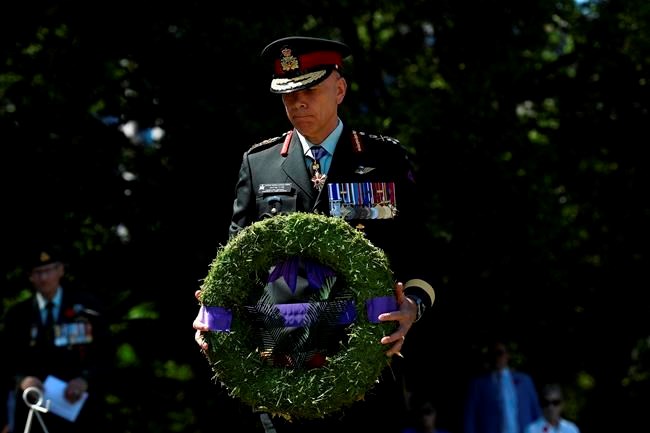OTTAWA — Canada's top military commander says he is starting to see "cracks" as the Canadian Armed Forces faces a confluence of challenges — many of them unprecedented — both at home and abroad.
In an interview with The Canadian Press, acting chief of the defence staff Lt.-Gen. Wayne Eyre said the military remains focused on its primary job: defending Canada from foreign and domestic threats and helping Canadians whenever and wherever needed.
Yet Eyre said he is worried about his troops — and the military as a whole — as they deal with sexual misconduct and hate in the ranks, personnel shortages, the COVID-19 pandemic and growing instability around the world.
"All of that together creates significant stress on the institution," he said. "So I am seeing some cracks in the institution as we go forward."
The Armed Forces has been battered for months with reports and headlines about inappropriate sexual behaviour involving senior commanders, which has left the military reeling and its top ranks in turmoil.
Eyre himself came into his current acting position after Adm. Art McDonald stepped aside in February due to a police investigation into an allegation of misconduct, only five weeks after taking over as Canada's defence chief.
The proliferation of allegations of sexual misconduct involving the top brass along with recent concerns about the presence of right-wing extremism in the ranks has forced the military into what many argue is a long overdue reckoning with its culture.
Eyre says he has embraced his role leading that effort, which will be vitally important for the long-term health of Canada's Armed Forces.
"Our collective moral authority has been diminished by all these reports," he said. "For many who've dedicated their lives to this institution, it is deeply painful. But we owe it to the institution — we owe it to our people — to continue to make it better."
The acting defence chief nonetheless admitted the resultant instability at the highest levels of the military has created challenges.
"It has had an impact on momentum and continuity," he said. "There's no way to get around that."
At the same time, the military has been called out to help bolster hospitals, long-term care facilities and other places battered by COVID-19 while assisting with the delivery and distribution of millions of vaccine doses across the country.
Troops have also been put on standby in case they are called out to help with natural disasters such as flooding and wildfires, even as the pandemic has cut into training and recruitment.
The military has shrunk by about 2,300 regular-force members during the pandemic, Eyre said, which is forcing many in uniform to pick up the slack. In addition, about 1,000 mid-level officers are either in positions where their skills don’t match up — "or just don't exist."
And through it all, Canada has maintained a large military presence in Latvia, Ukraine and Iraq even as climate change threatens stability, China and Russia are test the West’s resolve, and defence officials struggle with the dizzying pace of technological change.
"I'm very, very concerned because we're seeing a confluence of stressors in the security environment, the gravity of which we haven't seen for perhaps a century," Eyre said of recent world events. "So prior to the First World War."
As Canada's military gets pulled in different directions, Eyre says he is concerned about the mental health of his troops, who are also facing the same challenges as other Canadians when it comes to the COVID-19 pandemic.
"When we have capacity shortfalls, those that remain work extra hard," he said. "And so especially in the context of the pandemic and that additional stress, I'm quite worried about mental wellness and the impact this is having on our workforce."
The personnel shortages and competing priorities are also forcing military to adopt what Eyre described as "some pretty draconian prioritization discussions we put certain initiatives on the back burner."
The acting defence chief in March sent a message to the troops directing them to focus on four major areas: people, including the military’s culture; operations; training and readiness; and the need to prepare for future threats.
Work is also underway on what Eyre called a "reconstitution plan" to get the military, which has also scaled back training significantly during the pandemic, back up to full strength and working on the four priorities.
Exactly how long Eyre will remain commander of the Canadian Armed Forces remains unclear. Military police have not offered any update on their investigation into McDonald since February.
Some have questioned whether, in an extremely hierarchical organization like the military, Eyre is hamstrung by having the word "acting" in front of his title.
"There's uncertainty as to how long I’m going to be in this job," he acknowledged. "But I have to put that aside and every decision, I have to make it for the long term and own it."
This report by The Canadian Press was first published June 3, 2021.
Lee Berthiaume, The Canadian Press



